The Response - UWA Staff - The University of Western Australia
The Response - UWA Staff - The University of Western Australia
The Response - UWA Staff - The University of Western Australia
You also want an ePaper? Increase the reach of your titles
YUMPU automatically turns print PDFs into web optimized ePapers that Google loves.
‘<strong>UWA</strong> seems to be slow in picking up the sort <strong>of</strong> things I saw at Harvard Business school with the “learning hub”<br />
and students from cross-disciplinary areas working together on innovation, for example.’<br />
‘<strong>The</strong>re is a need to keep practical laboratory classes in science subjects to provide core skills to students and to<br />
engage with them in a positive learning environment.’<br />
‘<strong>The</strong> research/teaching focus <strong>of</strong> [the <strong>UWA</strong> Centre for Sleep Science] makes it quite unique worldwide and<br />
has already been used to obtain a successful NHMRC Grant…and attract Honours, Masters and PhD<br />
students from several Schools across the campus…. <strong>The</strong> new facility has also allowed me to develop a novel<br />
postgraduate teaching program with a gradually growing number <strong>of</strong> local, national and international students.<br />
Key to designing this programme was a structure that minimised face-to-face teaching time (in order to permit<br />
the research activities to continue) yet provide efficient, high-quality knowledge transfer. To this end the Sleep<br />
Science Postgraduate Educational Model is based on a combination <strong>of</strong> intensive block training (run in the first<br />
2 weeks <strong>of</strong> the mid-year and summer vacation periods) and flexible distance education units (online only, using<br />
WebCT and now LMS). A continuous education model is applied whereby there are multiple exit strategies for<br />
individuals (Certificate, Diploma, Masters) as well as the opportunity to build towards a PhD…. <strong>The</strong> educational<br />
model is equally suited to local and international students, who may wish to take the course on a full-time or parttime<br />
basis.<br />
I was recently approached by the <strong>University</strong> <strong>of</strong> Adelaide to develop a joint Graduate Diploma in Dental Sleep<br />
Medicine. This is now underway, with Sleep expertise being provided by the <strong>UWA</strong> online units, and the Dental<br />
expertise provided by UA via online units and a 3-day residency in Adelaide.<br />
Development costs for this type <strong>of</strong> online teaching programme are predominantly ‘up front’ and relate to<br />
development <strong>of</strong> the online lectures and assessments. Ideally, the <strong>University</strong> should provide a clear pathway for<br />
those seeking financial support to pursue the development <strong>of</strong> potentially productive teaching programs that<br />
support research activities.<br />
Inadequate IT support represents the death-knell for this type <strong>of</strong> online-heavy programme. In my view <strong>UWA</strong>’s<br />
transition from WebCT to LMS was handled very poorly. Ideally, the <strong>University</strong> should develop a mechanism to<br />
provide such specialised IT administrative support. Perhaps it could consider having IT (LMS) staff who could be<br />
temporarily co-opted to specific projects to help with their development.<br />
<strong>The</strong> intensive block teaching has been well received and is also very cost-effective. Accommodating students<br />
for this type <strong>of</strong> short-term visit is always challenging. Ideally, residential college accommodation could be made<br />
preferentially available to students participating in such intensive <strong>UWA</strong>-based block teaching periods which are<br />
held outside <strong>of</strong> the standard semesters.’<br />
‘Some <strong>of</strong> the innovations being trialled in the Accelerated Learning Lab have the potential to improve student<br />
experience. Recorded role-plays, interactive case studies and on-line exercises for small groups <strong>of</strong> students,<br />
combined with the ability to give immediate, accurate feedback on performance has great potential. We intend<br />
having our MBA students spend significant amounts <strong>of</strong> time in the Lab. This could be a good differentiator for us.’<br />
‘I teach a very large undergraduate marketing unit (1000+ students per year) and am moving towards a model<br />
<strong>of</strong> lecture/workshop/tutorial. <strong>The</strong> lectures will eventually be all online. A large workshop in the lecture theatre<br />
replaces the existing lecture….<strong>The</strong> workshops are not recorded and the activities I run in the workshop are<br />
examinable at the end <strong>of</strong> the year. <strong>The</strong> workshops are a clarification <strong>of</strong> the lecture content (that the students<br />
are expected to have already covered), and then predominantly activities that enhance their understanding <strong>of</strong><br />
the content. I get very good turnout to the workshop. I would propose that a model like this gives an online<br />
presence yet still focuses the on-campus experience. Another interesting aspect I am developing is having senior<br />
academics from the <strong>UWA</strong> marketing discipline give ‘state-<strong>of</strong>-the-art’ guest lectures during the workshop time,<br />
that are recorded. Ultimately, these <strong>UWA</strong>-content guest lectures would form the main basis <strong>of</strong> the online lectures,<br />
to emphasis the research content from <strong>UWA</strong>. This adds real value that the students can’t get from the text. So<br />
07 | www.uwa.edu.au


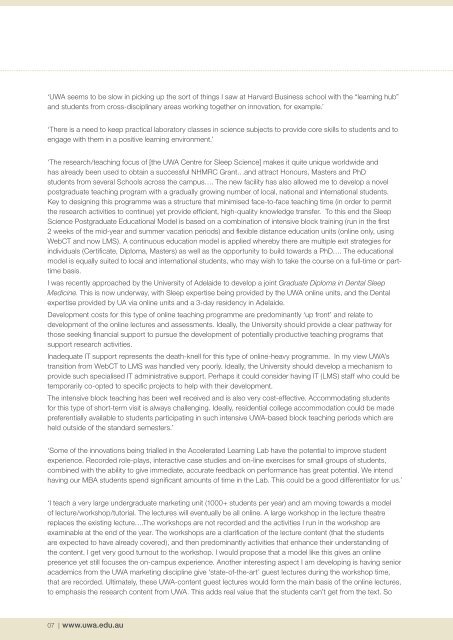
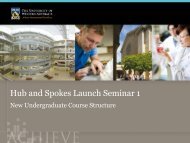
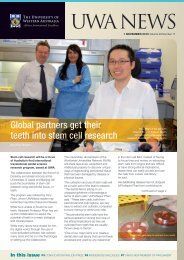
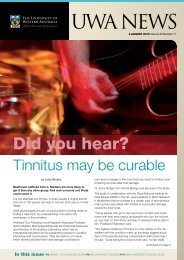
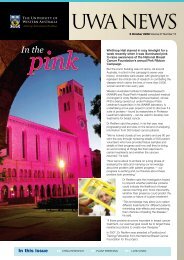
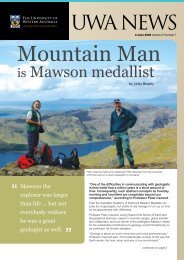
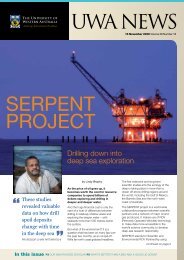
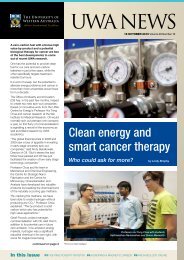


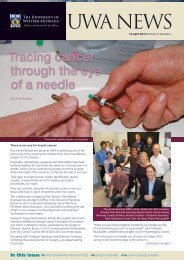
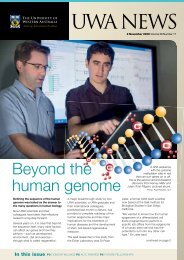
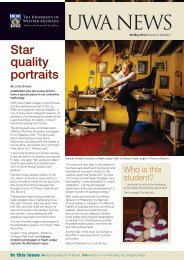
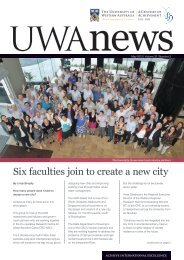
![Issue 13. 6 September 2010.pdf [PDF File, 1.7 MB] - UWA Staff - The ...](https://img.yumpu.com/26619782/1/184x260/issue-13-6-september-2010pdf-pdf-file-17-mb-uwa-staff-the-.jpg?quality=85)